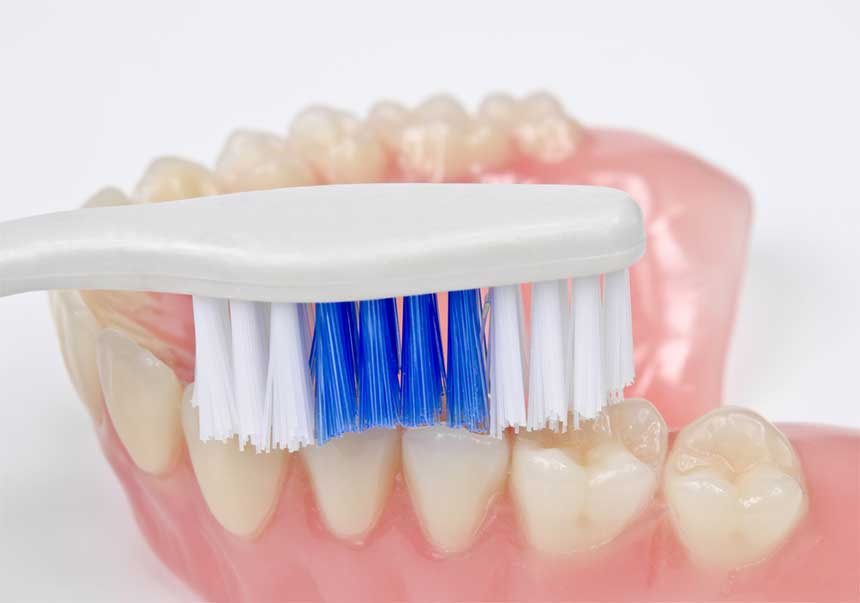
Dental care looks slightly different for denture wearers — no less because they swap traditional toothpaste and mouthwash for denture cleaner and tablets. Whether you have natural or artificial teeth, cleaning them daily is essential for removing the bacteria that cause bad breath and infections. If you’re new to dentures — or need a refresher on refreshing those porcelain pearly whites — this blog post will give an overview of everything you need to know about denture–cleaning tablets. So, without further ado, let’s sink our teeth into it!
Denture-Cleaning Tablets: An Overview
Denture–cleaning tablets contain chemical oxidants and ingredients that respectively remove food stains and bacteria beyond the reach of a denture brush. With the help of effervescent ingredients, cleaning compounds disperse to freshen up — and remove stains from — dentures. Brushing dentures post-soak will only deepen all these benefits.
What’s Inside
So, what specifically are these chemical oxidants and effervescent chemicals? If this gives you any idea, denture tablets’ chemical composition is a less abrasive variation on those of household cleaners and laundry detergents. Crack open denture tablets is this is what you may find:
- Sodium bicarbonate and citric acid: A salty duo that join forces to produce hydrogen-peroxide, ergo triggering that ‘effervescence’ that distributes the active ingredients throughout.
- Sodium lauryl sulphate: The surfactant that ensures everything gets into the solution.
- Potassium persulphate: Oxidises stains.
- Sodium perborate: Bleaches dentures to whiten them and kill bacteria.
- Sodium sulphite: Prevents the metal parts and pieces from corrosion.
- Penta-sodium triphosphate: Extends the life of the clean finish by stabilising the hydrogen-peroxide during the chemical reaction.
Teeth-grittingly important: While sharing a similar composition, household cleaners and denture–cleaning tablets are not one and the same. Ergo, when it comes to cleaning dentures, you should NOT alternate between the two. Using household cleaners on dentures is never a safe option, and you should always ensure you use a denture-specific cleaner.
How To Use Denture-Cleaning Tablets
Denture–cleaning tablets are rather user-friendly, as you can see from our step-by-step guide below:
- Prepare a glass or container of lukewarm water and put your dentures inside it.
- Put one of your denture tablets in the water and leave it to soak for however long the instructions on the packaging specify. A typical duration can look like three to five minutes, or it can be at least one hour.
- Once the ‘soaking’ time has passed, clean your dentures with the cleaning solution using a soft-bristled toothbrush or denture brush.
- Remove the dentures from the cleaning solution and rinse them under cold running water. It’s important to avoid hot water when dealing with dentures, as it can compromise their delicate, customised structure.
- The moment you’re finished with the cleaning solution, discard it.
Teeth-gritted disclaimer: Denture–cleaning tablets are a fantastic way to freshen dentures daily. However, just as someone with natural teeth shouldn’t rely on mouthwash alone, someone with dentures shouldn’t consider denture tablets the be-all and end-all. Here are some more critical aspects of denture cleaning to incorporate into your every day.
1. Daily Brushing
Remove your dentures from your mouth and clean them with a soft-bristled toothbrush or denture brush, as well as some liquid soap or denture cleaner. While denture tablets do give a great once-over, nothing compares to manual motions from a toothbrush, which stop plaque in its tracks and prevent further buildup. When brushing, you should never use regular toothpaste, as this contains abrasive ingredients that will wear out your dentures.
2. Post-Eating Maintenance
After you’ve finished eating (or drinking anything other than water, such as coffee), you should remove your dentures and rinse them with running water (remember: hot water will land you in hot water). You should also rinse your mouth. Note that you shouldn’t need to brush or use denture cleaner between these eating interludes. A rinse beneath running water will remove residue and dislodge enough plaque-causing food particles to keep your dentures feeling fresh.
3. Professional Consultations
While this isn’t a daily component of denture care, you should certainly consult a denturist if you’re finding stubborn stains that a brush can’t budge. As well as removing stains, denturists can check for cracks in your dentures that may be harbouring bacteria. In this case, they may recommend denture repair to prevent further damage, and potentially get to the bottom of why you can’t clean your dentures. Denturists can also polish dentures to appear shiny and new, with a surface so slick that it makes for easier day-to-day cleaning.
Booking Your Professional Consultation
Whether you need help with denture cleaning or another type of denture maintenance, you can count on Direct Denture Care to get to the bottom of whatever’s got you down in the mouth. From denture repairs (regular and emergency) to denture relining, we have all the services you need to keep your dentures aesthetic and functional.
Denture-wearing is a well-worn road, but we also have services for newbies — whether you want to fit partial dentures or the full enchilada — some available as a same-day service. For something more permanent, we also offer implant overdentures. To keep your dentures safe — regardless of whether you’re new to dentures or have been wearing them for a while — we can make you a mouthguard customised to your smile.
If you’re in need of any of the services above, book an appointment with Direct Denture Care today. You can find a clinic in either Balcatta or Hillarys in Perth.











